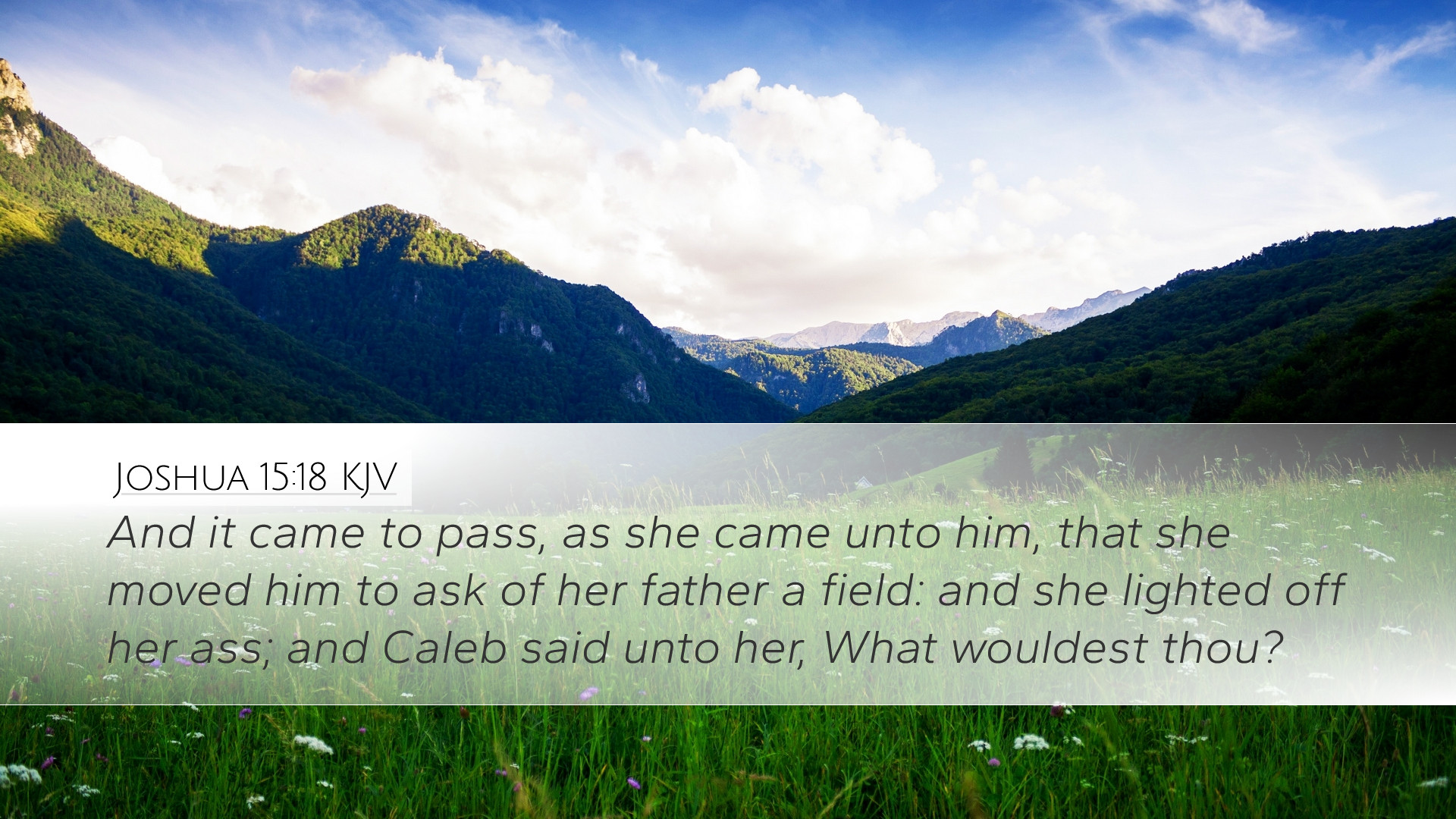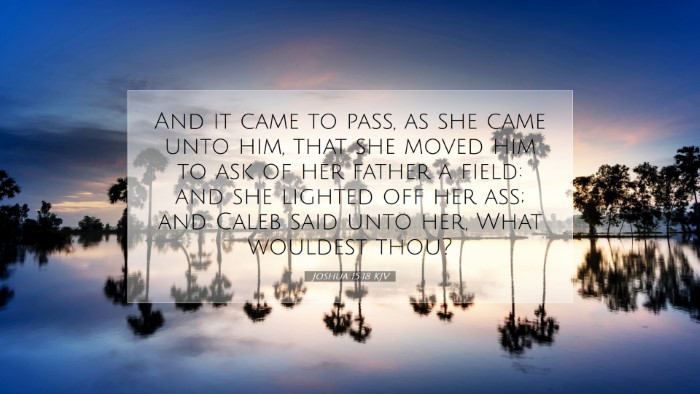Bible Commentary on Joshua 15:18
Joshua 15:18 states, "And it came to pass, as she came unto him, that she moved him to ask of her father a field: and she lighted off her ass; and Caleb said unto her, What wilt thou?"
Contextual Understanding
This verse occurs within the narrative of the allocation of land to the tribes of Israel after their conquest of Canaan. Caleb, the son of Jephunneh, is a prominent character who exemplifies faith and perseverance. His request to receive land reflects a deeper spiritual significance tied to God's promises and the faithfulness of His servants.
Insights from Public Domain Commentaries
Matthew Henry
Matthew Henry elucidates that this verse emphasizes the boldness and initiative of Caleb's daughter, Achsah. Her request for additional land serves not only as a narrative detail but also underscores the importance of seeking further blessings in the life of faith. Henry points out that Achsah's independent spirit and her understanding of her father's provision resonate with the biblical principle of asking boldly in faith.
Albert Barnes
Albert Barnes provides an in-depth analysis of the social customs reflected in this passage. He notes that Caleb's interaction with his daughter reveals a space for dialogue and the active role of women in the inheritance process. Barnes comments on the notion of inheritance in the cultural context of ancient Israel, where women's rights to land, though limited, were not entirely absent. He highlights that Achsah's request was grounded in wisdom, recognizing the fertile potential of the land she sought.
Adam Clarke
Adam Clarke contributes his perspective by exploring the geography of the land mentioned. He explains that the region was known for its fertility, and Achsah's petition for springs of water indicates her foresight in recognizing the need for sustenance in agriculture. Clarke emphasizes that Achsah’s persuasiveness reflects her understanding of the agricultural conditions necessary for a successful life in the land. This serves as a metaphor for spiritual sustenance, suggesting that believers must seek out the resources necessary for growth in their spiritual lives.
Theological Reflections
Theologically, this passage encapsulates themes of inheritance—both in the material and spiritual senses. It invites commentary on the believers' inheritance through Christ, paralleling Achsah's request for land to the broader Christian call to seek out the richness of God's grace and blessings.
Faith and Initiative
The importance of faith-filled initiative is exemplified in Achsah's actions. She demonstrates an understanding of inheritance that is active rather than passive. Both Matthew Henry and Barnes highlight that spiritual blessings are sought through earnestness and faith. This notion challenges contemporary believers to pursue spiritual growth with the same tenacity shown by Achsah.
Empowerment and Agency
Achsah's request illustrates a form of empowerment that aligns with the biblical principle of stewardship. Contextually, she operates within the bounds of her cultural environment yet understands her rights and utilizes her father's favor. This pattern is significant for modern discussions of agency, particularly regarding women in ministry and their place in the church.
Application for Pastors and Students
Pastors and students of theology can draw numerous applications from this text. The concept of asking boldly is pertinent for prayer life and seeking God’s will. By understanding the context and pulling insights from historical commentaries, faith leaders can encourage congregations to pursue their spiritual inheritances actively.
-
Boldness in Faith: Encouraging congregants to be fearless in their requests from God, demonstrating persistence in prayer.
-
Understanding Inheritance: Teaching about the richness of God's promises and the importance of spiritual inheritance in Christ.
-
Women in Ministry: Further discussions can emerge about the role of women in service to the church, drawing parallels from Achsah's example.
Conclusion
Joshua 15:18 serves as a profound narrative showcasing the interplay of faith, initiative, and intergenerational relationship within the context of God's promises. The insights from Matthew Henry, Albert Barnes, and Adam Clarke provide a multi-faceted understanding of this verse, enriching the reader's perspective and encouraging a deeper exploration of biblical themes relevant to both historical and contemporary faith experiences.


